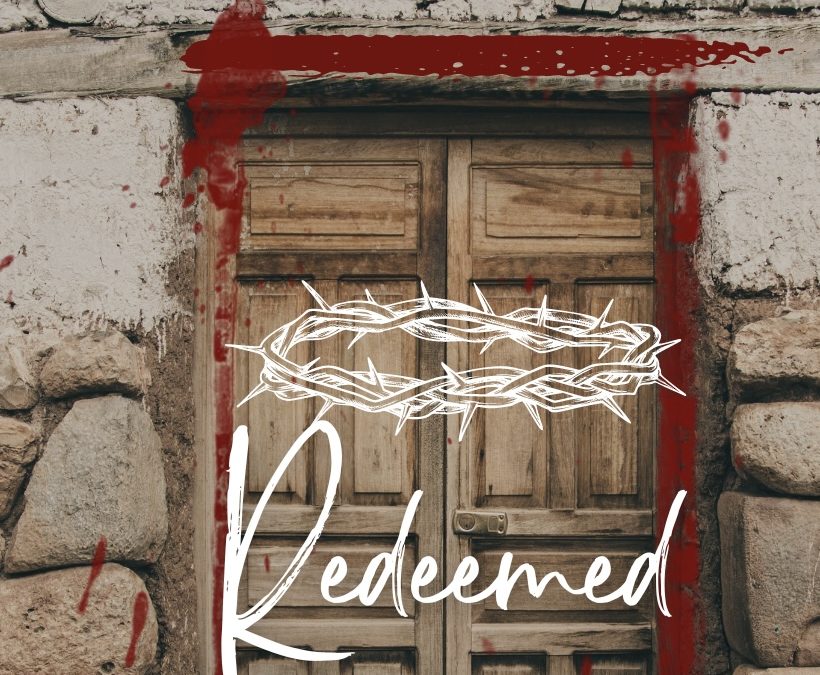The four gospels state that the Last Supper took place in the week of the Feast of Passover, days after His Triumphal Entry into Jerusalem and before Jesus was crucified on Good Friday.
On that dreadful night of the last plague, this remarkable salvation foreshadowed the coming sacrifice of Jesus (Yeshua), the Messiah, the Lamb of God, who was slain on Passover and whose innocent blood also saved us from death and destruction.
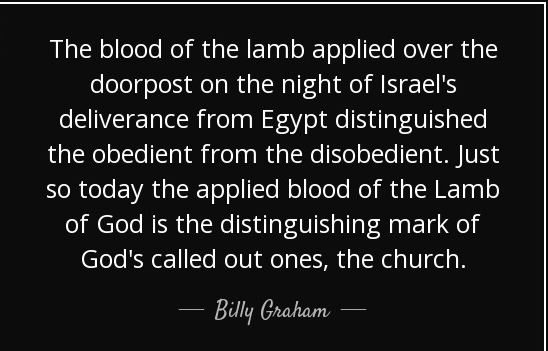
The Bible repeatedly emphasizes this of Passover, “And this day shall be for you a memorial…” (Exodus12:14); “And Moses said to the people: remember this day in which you come out from Egypt, out of the house of bondage…” Keep the Passover unto the Lord your God, as it is written in this book of the covenant.” [II Kings 23:21 Deuteronomy7: 18); “that you may remember the day when you come out of the land of Egypt all the days of your life” (Deuteronomy16:3). (Exodus13:3); “You shall remember what Adonai your God did to Pharaoh…”
Ten Egyptian Plagues For Ten Egyptian gods and goddesses
The God of Israel is the One and only God.
Ten times, God, through Moses, allows Pharaoh to change his mind, repent, and turn to the one true God, each time increasing the severity of the consequences of the plagues suffered for disobedience to His request. Ten times, Pharaoh, because of pride, refused to be taught by the
Lord, and receives “judgments” through the plagues, pronounced upon his head from Moses, the deliverer.
The last plague 10th one was the slaying of the firstborn Egyptian males. During this plague, we are told, the Israelites painted their doorposts with the blood of the sacrificial lamb so the Angel of Death would see the Blood of the lamb applied to the doorposts of their homes and pass -over them.
Anyone, even an Israelite, who failed to apply the blood would have been subject to the same judgment as the Egyptians.
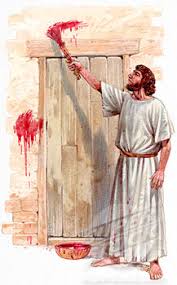
This is My blood of the new covenant, poured out for many.” (Mark 14:24)
“And the blood shall be to you for a token upon the houses where you are: and when I see the blood, I will pass over you, and the plague shall not be upon you to destroy you, when I smite the land of Egypt.” (Exodus 12:13)
Yeshua proclaimed this when He said, “I am the resurrection and the life. He who believes in Me will live, even though he dies; and whoever lives and believes in Me will never die.” (John 11:25–26)
With these words, He assured us that when God judges the world, we will be saved by the blood of the Lamb if we put our faith in the Messiah and the blood of redemption; God will again “pass over” us.
- Exod 12:13 – And the blood on the houses where you are staying shall be a sign for you: when I see the blood I will protect you so that no plague will destroy you when I strike the land of Egypt.
- Exod 12:23 – For when the LORD goes through to smite the Egyptians, He will see the blood on the lintel and the two doorposts, and the LORD will protect the door and not let the Destroyer enter and smite your home.
- Exod 12:27 – You shall say, “It is a sacrifice of protection to the LORD, because He protected the houses of the Israelites in Egypt when He smote the Egyptians, and saved our houses.” The people then bowed low in homage
While they were eating, Jesus took some bread, and after a blessing, He broke it and gave it to the disciples, and said, “Take, eat; this is My body.” —Matthew 26:26
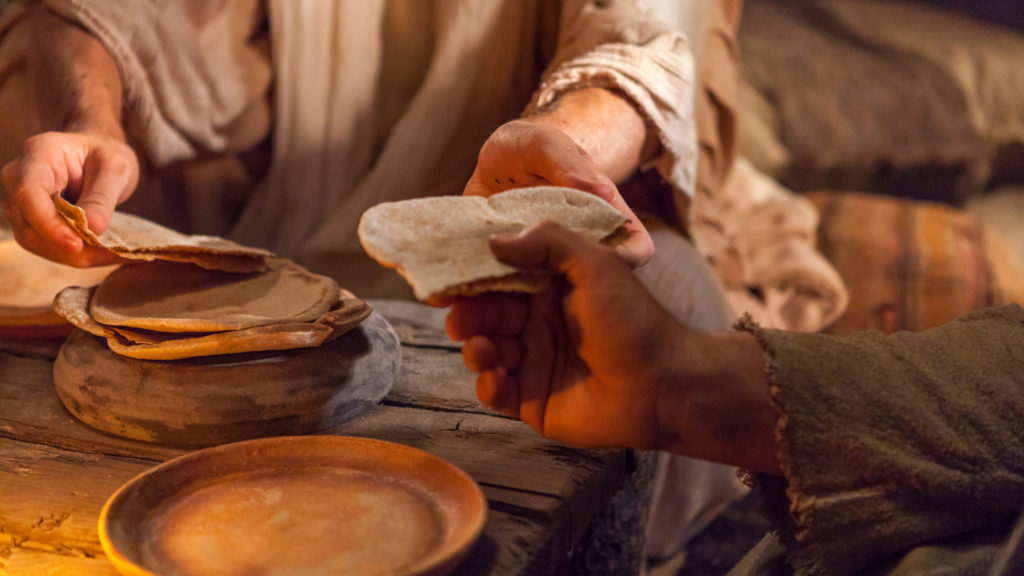
The feast of Passover, the Last Supper, is the final meal that Jesus shared one last meal with his disciples.
The four gospels state that the Last Supper took place in the week of the Feast of Passover, days after His Triumphal Entry into Jerusalem and before Jesus was crucified on Good Friday.
“And He said to them, ‘I have eagerly desired to eat this Passover with you before I suffer.’” (Luke 22:15)
It was during this Passover Seder that Yeshua inaugurated the Brit Chadashah (New Covenant) with His disciples, when He said, “This cup is the new covenant in My blood, which is poured out for you.” (Luke 22:20)
The highlight of Passover is a communal meal called the Seder (which means “order” because of the fixed order of service), which is a time to rejoice and celebrate the deliverance for the Hebrews that God accomplished through the exodus.
The New Testament Passover is a memorial of the suffering and death of Jesus. Let us therefore celebrate the festival, not with the old leaven, the leaven of malice and evil, but with the unleavened bread of sincerity and truth (1 Corinthians 5:8).
While they were eating, Jesus took bread, and when he had given thanks, he broke it and gave it to his disciples, saying, ‘Take it; this is my body.’ Then he took a cup, and when he had given thanks, he gave it to them, and they all drank from it. ‘This is my blood of the covenant, which is poured out for many,’ he said to them.” —Mark 14:22-24
And Jesus said unto them, I am the bread of life: he that cometh to me shall never hunger, and he that believeth on me shall never thirst.” John 6:35
For I received from the Lord what I also handed on to you, that the Lord Jesus on the night when he was betrayed took bread, and when he had given thanks, he broke it, and said, “This is my body which is [broken] for you. Do this in remembrance of me.” In the same way, he also took the cup after supper, saying, “This cup is the new covenant in my blood. Do this, as often as you drink it, in remembrance of me” (1 Corinthians 11:23-25).
As you partake of communion, His body is the bread, and His Blood (grape juice) (unfermented wine)
- Remember Jesus, your Savior, dying on the cross for your sins
- Be thankful for the price He paid through all that he suffered for your salvation and healing
- Proclaim his death and resurrection
- Give thanks
- Examine your heart
- Commune with God as you receive The benefits of His promises
- Acknowledge His covenant
- Anticipate his return
When Jesus spoke of His “broken” body at the Last Supper, He referred to His sacrifice on the cross. His body was broken, and His blood was shed. According to John 6:35, partake in communion ” Jesus’ broken body and His shed blood.
I’ve witnessed miracle healings when individuals partake of communion, receiving healing during and testifying of His power in their healed bodies.
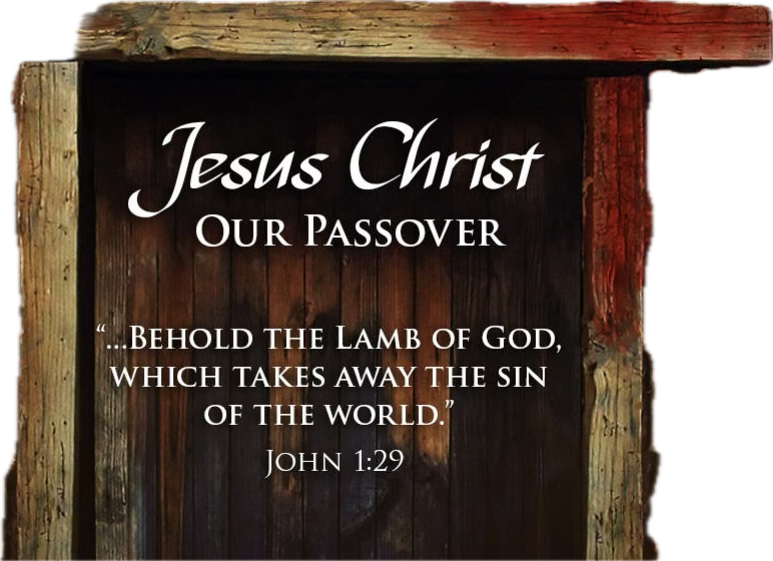
In Him, we have redemption [that is, our deliverance and salvation] through His blood, [which paid the penalty for our sin and resulted in] the forgiveness and complete pardon of our sin, in accordance with the riches of His grace—Ephesians1:7
“And He said to them, ‘I have eagerly desired to eat this Passover with you before I suffer.’” (Luke 22:15)
It was during this Passover Seder that Yeshua inaugurated the Brit Chadashah (New Covenant) with His disciples, when He said, “This cup is the new covenant in My blood, which is poured out for you.” (Luke 22:20)
John 1:29, where John the Baptist sees Jesus and exclaims, “Behold the Lamb of God who takes away the sin of the world.”
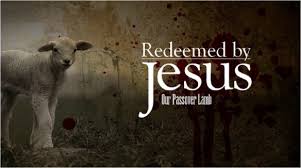
But with the precious blood of Christ, like that of an unblemished and spotless lamb.
1 Peter1:19
The newborn lambs would be wrapped tightly… swaddled… in specially designated temple cloths, and they would be laid in a manger to keep them contained while they were being examined for blemishes. At the appointed time, the shepherds would separate the lambs, selecting only the firstborn males without marks or blemishes. They would lead them to Jerusalem, where they would be purchased by people wanting to present a sacrifice before the Lord to atone for their sins. During the feast of Passover.
This is My blood of the covenant, which is poured out for many.” (Mark 14:24)
“And the blood shall be to you for a token upon the houses where you are: and when I see the blood, I will pass over you, and the plague shall not be upon you to destroy you, when I smite the land of Egypt.” (Exodus 12:13)
Why do we call the holiday ‘Passover’?
Peasch means Passover. The name ‘Pesach’
It is written פסח in Hebrew and can be associated with two words: the sacrificial “lamb” (פסח), and the “pass-over.”
Did you know? Easter is used only in the King James Bible it uses Easter instead of the pass-over Lamb.

